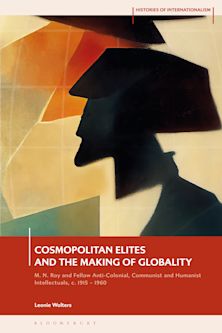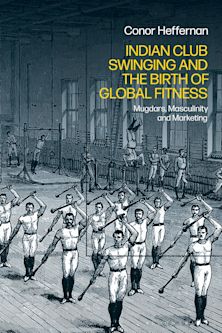- Home
- ACADEMIC
- History
- World History
- Perilous Passage
This product is usually dispatched within 3 days
- Delivery and returns info
-
Free CA delivery on orders $40 or over
You must sign in to add this item to your wishlist. Please sign in or create an account
Description
In this innovative and ambitious global history, distinguished economic historian Amiya Kumar Bagchi critically analyzes the processes leading to the rise of the West since the sixteenth century to its current position as the most prosperous and powerful group of nations in the world. Integrating the history of armed conflict with the history of competition for trade, investment, and markets, Bagchi explores the human consequences for people both within and outside the region. He characterizes the emergence and operation of capitalism as a system driven by wars over resources and markets rather than one that genuinely operates on the principle of free markets. In tracing this history, he also charts what happened to the people who came under its sway during the last five centuries.
Bagchi thus broadens our understanding of the nature and history of capitalism and challenges the fetishism of commodities that limits the perspective of most economic historians. The book also challenges the Eurocentrism that still underlies the conceptual framework of many mainstream historians, joining earlier narratives that chronicle the history of human beings as living persons rather than as puppets serving the abstract cause of "economic growth."
His unflinching examination of the human costs of development—not only in the colonial periphery but in the core nations—includes not only economic processes and issues of inequality within and among nations but also the intertwining of economics and war-making on a world scale. The book also contributes to our knowledge of how and in what sequence human health has been shaped by public health care, sanitation, modern medicine, income levels and nutrition. Written with extraordinary range and depth, Perilous Passage will change the ways in which we think about many of the largest issues in world history and development.
Table of Contents
Chapter 1: The History of Human Development as the Subject of History
Chapter 2: The Construction of the European Miracle
Chapter 3: Profit Seeking under Actually Existing Capitalism and Human Development
Part II: Capitalist Competition and Human Development in Europe
Chapter 4: Combat for Dominance Among the Western European Countries Since the Sixteenth Century
Chapter 5: Population Growth and Mortality Between the Sixteenth and Nineteenth Centuries: A First Look
Chapter 6: The Netherlands: Rise and Fall of a Hegemonic Power
Chapter 7: The Delayed Transition of Europe and North America to a Low-Mortality Regime
Chapter 8: Literacy in Western Europe Since the Sixteenth Century
Part III: Non-European Peoples in the Age of Emergence of European Dominance
Chapter 9: Economic Development and the Quality of Life in China Between the Sixteenth and Eighteenth Centuries
Chapter 10: India under Mughal Rule and After
Chapter 11: Conducting Trade in Asia Before and After the European Advent
Chapter 12: Reconsidering Japanese Exceptionalism
Chapter 13: Capitalist Competition, Colonialism, and the Physical Well-Being of Non-European Peoples
Chapter 14: The Civilizing Mission and Racialization: From the Native Americans to the Asians
Chapter 15: The Civilizing Mission in Lands Taken by the European Settlers from the Original Inhabitants
Chapter 16: Intercontinental Resource Flows Sustaining the Ascent of the European Powers
Chapter 17: Colonial Tribute and Profits, 1870s Onward
Chapter 18: Demographic Disasters in the Colonies and Semi-Colonies in the High Noon of European Colonialism
Part IV: The Twentieth Century: Anti-Systematic Struggles, Wars, and Challenges to Global Capital
Chapter 19: Setting the Stage for Megawars
Chapter 20: Revolution, Nazism, Japanese Militarism and the Second World War
Chapter 21: Imperialism and Wars in the Late Twentieth Century
Chapter 22: Capitalism and Uneven Development in the Twentieth Century
Chapter 23: Destruction and Renewal in the Global Order of Imperialism and Neoliberalism
Chapter 24: Contradictions, Challenges, and Resistance
Product details
| Published | Jan 28 2008 |
|---|---|
| Format | Paperback |
| Edition | 1st |
| Extent | 422 |
| ISBN | 9780742539211 |
| Imprint | Rowman & Littlefield Publishers |
| Dimensions | 230 x 153 mm |
| Series | World Social Change |
| Publisher | Bloomsbury Publishing |
About the contributors
Reviews
-
A good deal that we have seen before is still or again relevant to today's global capitalism, and Bagchi usefully reminds us of how many of these parallels are harrowing rather than hopeful; one hopes this book will reach the people who believe the stories Bagchi debunks and enrich a vital set of debates.
Kenneth L. Pomeranz, University of Chicago, Economic and Political Weekly
-
Explores the numerous ways the armed ascendancy of European capital has impacted the human development of the nonwhite dependencies of Europe and the Europeans themselves. Discusses human development and capitalist growth; capitalist competition and human development in Europe; the world beyond Europe in the age of the emergence of European dominance; and the antisystemic struggles, wars, and challenges to global capital.
Journal of Economic Literature
-
This stimulating synthesis . . . has an excellent bibliography, incorporates recent specialist work in global economic history, and is genuinely erudite. A valuable reference for all world historians . . . Highly recommended.
Choice Reviews
-
A hard-headed examination in facts and figures of how capitalism has insidiously but inexorably destroyed human happiness and ravaged our ecological system. . . . A compelling and thoughtful account with the lucidity of argument of someone compressing the essence of a lifetime's research into a philosophical framework.
The Statesman
-
Magisterial. . . . [Bagchi] presents a comprehensive comparative picture of the historical economic development of China, India, and Japan, and their relation to what happened in Europe and North America. It is hard to suggest another work that does this in as small a space, so clearly, and based on such extensive acquaintance with the empirical literature. . . . It is refreshing to have Bagchi’s voice added to the rather small list of important works on the origins and development of the modern world. . . . One can only hope that the book will have a wide international reading public.
Immanuel Wallerstein, Fernand Braudel Center, Yale University, Monthly Review
-
Bagchi has written a great book, a history of human development as he calls it, which offers a fascinating account of global capitalism as it evolved over a period of four centuries. . . . Writing a 'grand history' as Bagchi has done will inevitably create controversy . . . but this does not in any way diminish the significance of this monumental history of the human costs of economic growth.
Development and Change


































